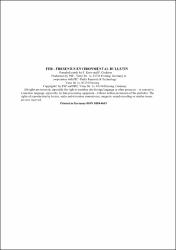BIOLOGICAL ACTIVITIES OF URGINEA MARITIMA L. BAKER
Abstract
Food-spoilage pathogens threaten human health. Moreover, these pathogens are resistant to antibiotics. Scientists are in search of a new path against these pathogens. In this study, biological activities of plant known as the "ada sogani" in Turkey was studied and made a contribution to the literature. There are less studies on biological activities of Urginea maritima collected from Mugla province. The aim of this study is to determine the antimicrobial, antioxidant and antimutagenic activities of U. martima. Urginea maritima from Mugla province were collected for antimicrobial, antioxidant and antimutagenic studies. The antimicrobial activities have been analyzed with the disc diffusion method. A total of eight microorganisms were used in the study, seven of them were bacteria and the other was yeast. Non-enzymatic antioxidant activity tests have been done with the 1,1-diphenyl-2-picrylhydrazyl (DPPH) method. For the antimutagenic activity studies an Ames Test was used. The antimicrobial activity of plant was found effective against food pathogens. The radical scavenging activity of plant was determined as 80 %. In addition, the antimutagenic activities of U. maritima were found to be 58.2% for Salmonella Typhimurium TA98 and 32.9% for Salmonella Typhimurium TA100. These values are high and important. As a result, it can be told that Urginea maritima has antimicrobial, antioxidant and antimutagenic capacities. This plant is thought to be a good candidate for new agent searches.


















